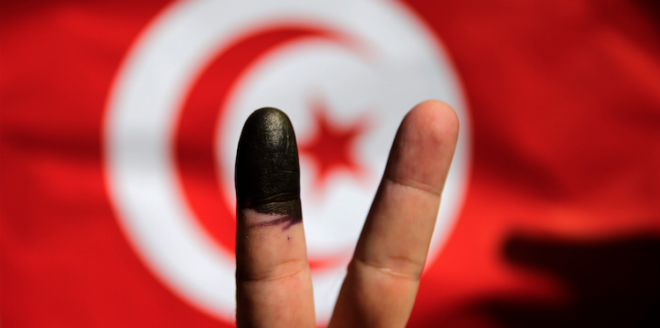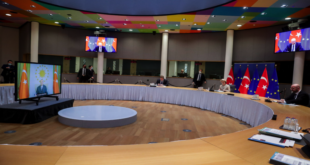d’Hervé Bazin: «… seul celui qui n’a rien à perdre et tout à gagner met en œuvre toute la voracité de l’intelligence».
The situation in Tunisia after the election of the Ennahda party in October 2011 was chaotic. Very poor management of state affairs was accompanied by economic and social failures. Tunisians, it is safe to say, were not happy with the balance sheet of the Troika (the coalitions between Ennahda, Ettakatol and the Congress for the Republic Party) during its 3 years in power.
In the meantime, the new constitution has been drafted to general satisfactory. Hailed as one of the most progressive and even the most advanced in the Arab-Muslim world, the new Tunisian constitution includes, in the opinion of several experts, major advances such as recognition of the universal values of human rights, freedom of conscience and consecration of gender equality.
However, while the legislative and presidential elections may have been relatively well conducted in good conditions, they have not secured a win for any progressive party born after the revolution and seeking to unify all democratic political trends.
Habib Essid was appointed Prime Minister on 5 January by the Nidaa Tunes party, winner of the elections on October 26, 2014, and mandated to form the new government. Thursday, February 5, 2015 was marked by the vote of confidence in the Essid administration, which it won by a large majority of 166 out of 204 votes (81% of the votes cast) and a total of 217 seats in the assembly. These were the best figures since the elections of 23 October 2011 : the Jebali government obtained 154 votes and Jomaa 149 votes. As for the Laârayedh government, it won only 139 votes.
This backing should provide the new government with a solid platform to implement its programme.
Evaluating the composition of the Essid government
The government of Hbibi Essid is composed of representatives of Nidaa Tounès(86 deputies), Ennahda (69) the Free Patriotic Union (16 members) and the liberalAfek Tounès(8).
Did the new head of government make the right choice? A provisional ‘yes’ can be offered, awaiting concrete results after 100 days of the administration’s rule.
The first point to be made is that this composition ensures that the government has a large majority in the battle for any vote of confidence – indeed, this is precisely what won it 166 votes, as mentioned above. The vote of confidence will also provide a strong political and popular mandate and will help, without a doubt, to alleviate tensions surrounding the required program of structural reforms.
Secondly, the involvement of Ennahda in the government will strengthen the moderate wing of the Islamist party. This is another important step in convincingEnnahda to resist the dominance of the so-called hardline ‘Brotherhood policies’ and gradually transform themselves into an ‘Islamic democratic party’.
Thirdly, Ennahda’s inclusion demonstrates respect for the ‘Compliance Policy’, which led to the success of the democratic transition thus far and was behind what is now described as the ‘Tunisian exception’.
This reflects the leaders of the two major parties’ insistance on the need to continue to strengthen the legitimacy of elections and national unity as a the two pillars of the democratic project. In such a way, an environment can be created that prevents the Tunisian exception’s setback or collapse.
It should be noted, in this regard, that the success of the Tunisian model of the democratic transition and specifically the ‘reconciliation’ between Islam and democracy is no longer of only national interest.
Indeed, powerful international actors, particularly the United States and the European Union, have worked to present this model as an example for the entire Arab and Islamic world. This facet of the West’s strategy seeks to incorporate moderate Islamic movements into the democratic game in order to isolate extremist currents which, through their affinity with terrorist groups, represent a serious threat to international peace and security.
The Place of Women in the Essid Government
Of 42 government members (including Habib Essid), there are only 8 women, less than 20% of the total. Women hold only 11% of ministerial posts and just 36% of state secretariats.
The three female ministers are:
- the Minister of Tourism and Handicrafts
- the Minister of Women, Family and Children
- the Minister of Culture
The five Secretaries of State are:
- Secretary of State to the Minister of Finance
- Secretary of State for international cooperation
- Majdoline Cherni, sister of Socrates Cherni, lieutenant of the National Guard killed in an attack attributed to jihadists will be handling the case of martyrs and wounded of the revolution.
- Secretary of State responsible for agriculturale production
- Secretary of State to the Minister of Development, Investment and International Cooperation
More than a million women voted in the last election, many of them believing in the Prime Minister’s promises and ability to meet his commitments. Has he decided to ignore them once installed in Carthage?
This relative exclusion of women threatens to undermine the otherwise broad composition of the government.
Government Priorities
For the first time in the political history of Tunisia, a government has methodically and precisely outlined its priorities. It has also drawn up a timetable, formalising the principle of the 100 day ‘honeymoon period’ traditionally granted to new governments before their work is properly assessed.
According to specific assurances given by Prime Minister Essid, the 100-day period will be divided into two distinct periods.
The first will be 10 days to allow ministers to make field visits to all governorates in order to determine the country’s 10 most fundamental problems. The government will then commit to tackling the 5 most severe by the end of its first 100 days in power.
The second period, which spans 90 days, will focus on achieving the aforementioned commitments and preparing a detailed and precise budget for the state.
At the end of these 100 days, Essid will present the results to the assembly to reflect the achievements of his government. According to the Prime Minister, the first three priorities during the 100 days will be national security, the stabilisation of prices and environmental cleanliness.
These measures are divided into 6 main areas: the fight against terrorism, basic consumption, protection of the environment, development of municipalities, increasing tourism and social improvement programmes.
Good luck to the new government: they face many challenges.
The views expressed in this article are the author’s own and do not necessarily represent those of ForMENA.
 ForMENA Council for MENA affairs
ForMENA Council for MENA affairs




